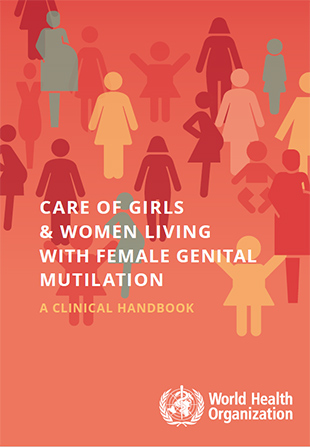Girls and women who have been subjected to female genital mutilation (FGM) need high quality, empathetic and appropriate health care to meet their specific needs. WHO has launched a new clinical handbook to help health care workers provide such
care.
About FGM
More than 200 million girls and women alive today have experienced FGM in 30 countries in Africa, the Middle East and Asia where FGM is concentrated. FGM is a global issue however, and there are girls and women living with FGM in all regions of the world. It is therefore crucial that health care workers everywhere are able to recognise FGM and to treat girls and women effectively.
FGM is recognized internationally as a grave violation of the human rights of girls and women. It comprises all procedures that involve partial or total removal of the external female genitalia, or other injury to the female genital organs for non-medical reasons. FGM has no medical justification, causes only harm, and must never be carried out. Health care providers must never subject girls and women to FGM, and those who do are violating the human rights of the girls and women in their care.
We cannot turn a blind eye to the many health-care needs of girls and women who have been subjected to FGM. This new clinical handbook will help health-care providers give the care that is so critically needed.; Christina Pallitto, WHO focal point on FGM
New WHO clinical handbook
In nine easy-to-read chapters, the new WHO Clinical handbook – Care of girls and women living with female genital mutilation gives essential information to health care professionals on how best to provide care to girls and women who have been subjected to any type of FGM, either recently or several years previously.
It includes advice on how to:
- communicate effectively and sensitively with girls and women who have developed health complications due to FGM;
- communicate effectively and sensitively with the husbands or partners and family members of those affected;
- provide quality health care to girls and women who have health problems due to FGM, including immediate and short-term urogynaecological or obstetric complications;
- provide support to women who have mental health and sexual health complications caused by FGM; make informed decisions on how and when to perform deinfibulation
- identify when and where to refer patients who need additional support and care; and
- work with patients and families to prevent the practice of FGM
Overlooked and invisible
FGM has multiple potential negative consequences for health and well-being, many of which are invisible, and often go overlooked. Health providers, for example, are often not comfortable discussing or addressing the negative consequences of FGM for mental health and sexual health – which can put girls and women at risk of further suffering. The new WHO Clinical handbook gives health-care workers the support and information they need in order to effectively address mental health and sexual health issues for women and girls living with FGM.
Mental health
FGM can be a traumatic experience which may have both immediate and prolonged negative psychological consequences.
Studies have found that girls and women who have experienced FGM may have higher rates of depression, anxiety disorders, post-traumatic stress disorder, and somatic (physical) complaints with no organic cause (e.g. aches and pains).
The new handbook’s chapter on mental health gives health care professionals guidance on how best to conduct an appropriate mental health assessment and how best to provide basic mental health care management and support for girls and women living with FGM.
Sexual health
Good sexual health is fundamental to all people’s health and happiness, and has a positive impact on many aspects of our lives, including our reproductive health and well-being. FGM damages anatomic structures that are directly involved in female sexual function, and can therefore also have an effect on women’s sexual health and well-being. The new WHO clinical handbook dedicates an entire chapter to this topic, including detailed and easily understandable information on sexual health, in recognition of the importance to address all aspects of health for women affected by FGM. The handbook includes information on women’s sexuality, as well as the sexual health consequences of FGM and how to address such negative consequences.
Too often sexual health is overlooked because providers and patients may be uncomfortable discussing it. This new WHO handbook helps providers to talk about sexual health with women. It also provides practical suggestions on how to address and treat sexual health issues, which will help to ensure that women’s health and well-being is addressed more completely.Christina Pallitto, WHO focal point on FGM
Who the handbook is for
The handbook is aimed for use by health care providers, including obstetricians and gynaecologists, surgeons, general medical practitioners, midwives, nurses, and other front line health workers. Notably, the handbook is also useful for health
care professionals providing mental health care, as well as educational and psychosocial support, such as psychiatrists, psychologists, social workers and health educators.

